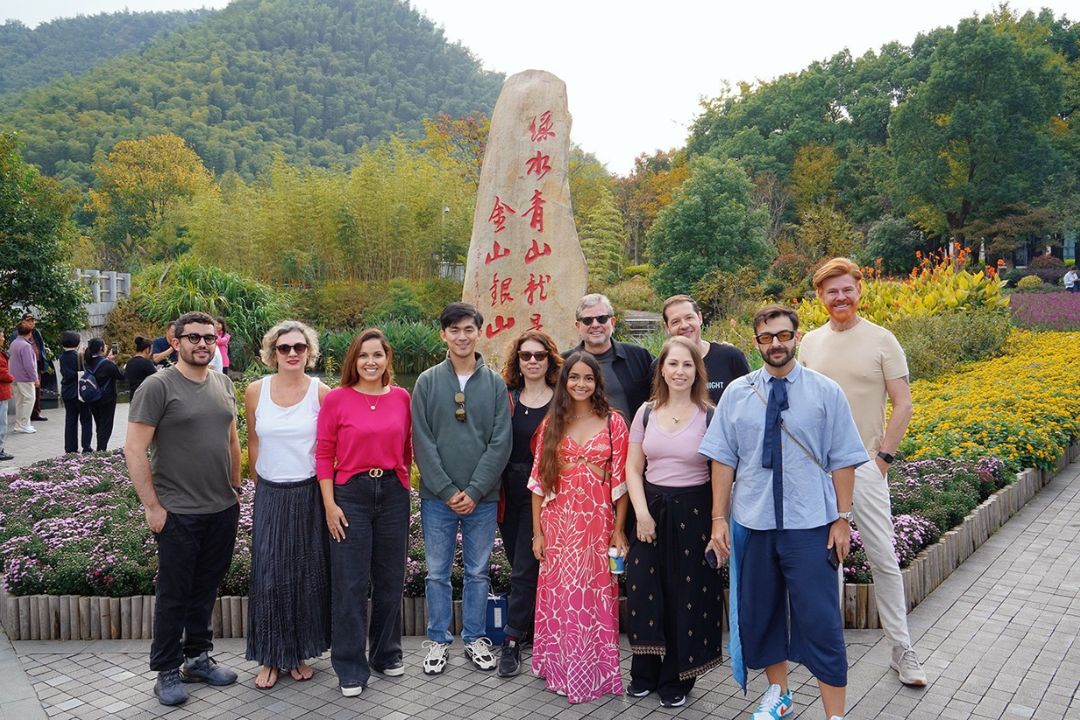
By Tao Xing
“What percentage of China’s energy comes from solar and what comes from hydropower?” On the night of October 14, the day they arrived in China, members of a cultural and media group from Brazil asked this question at the dinner table.
After learning that “as of June 30, the installed capacity of renewable energy (wind, solar, hydro and biomass) in China had reached 1.653 billion kilowatts, that is, about 53.8% of the country’s total installed capacity ”, they nodded satisfied and continued their meal.
This group of nine renowned Brazilian culture and media professionals was invited to China to participate in cultural exchanges in Beijing, Sichuan and Zhejiang Provinces and Shanghai, from October 14th to 25th, as part of “Discover China : Tour of Cultural Figures of Brazil”, co-organized by the Center for the Americas of the China International Communications Group (CICG), in collaboration with Kwai, a social network for sharing short and trending videos. Themed Explore Dynamic China and Embrace China-Brazil Friendship, the tour aimed to present a comprehensive and accurate picture of China and promote mutual understanding between the people of China and Brazil. Kelly Dores, a journalist with Brazilian media agency Propmark, said: “I am happy to see that China is working hard to build a communication platform between the people of China and Brazil, as this is very important.”
Of the group’s nine members, seven were visiting China for the first time. However, Ricardo Piquet, general director in Brazil of the Institute of Development and Management and president of the Museum of Tomorrow, had already visited China twice, in 2006 and 2016. He expressed his pleasure at being in China again and witnessing how the country has transformed in such a short time. “I came to witness and hope that this rapprochement between China and Brazil happens in the best possible way”, he declared.
Dialogue – On October 16, after attending the photo exhibition Bela China, Belo Brasil – Commemoration of the 50th Anniversary of China-Brazil Diplomatic Relations, at the China-Latin America Cultural Exchange Center in Beijing, the nine tour participants engaged in a special dialogue with Chinese experts and some Brazilians residing in China.
“Whoever regularly reads news about China, please raise your hand,” said Filipe Porto, a Brazilian editor working at CICG Americas, addressing the nine tour members. Everyone raised their hands. Then, Porto said: “Anyone who believes that the Brazilian media does a good job reporting on China, please raise your hand.”
Nobody got up. This opened a discussion about the challenges of promoting a true image of China in Brazil. Wesley Gonsalves, a reporter for the São Paulo newspaper O Estado de São Paulo, noted: “The influence of American media, such as The New York Times, is significant in Brazil; its reporting on the Chinese economy affects Brazilian perceptions. The influence of Chinese economic media in Brazil still needs to be strengthened.”
Mauro Ramos Pinto, correspondent for TV dos Trabalhadores in China, participated as a guest in this dialogue. He explained that Brazilians’ mistaken notions about China stem from reports from the mainstream international media, which defend the interests of the Global North and not those of Brazil. As a reporter in China, he works to understand China and convey this understanding to Brazilians.
Brazilian food blogger Larissa Soares, a member of the tour group, expressed a desire to see not just economic statistics and political topics, but more cultural content, such as about Chinese cuisine, to increase China’s appeal through programs related to Chinese cuisine. food.
Professor Xiang Yunju, executive dean of the Academy of International Communication of Chinese Culture at Beijing Normal University, presented a project inviting young Brazilian students to go to China to film documentaries. He highlighted that cinema and cultural exchanges in general strengthen understanding between the people of the two countries. You mentioned a young Brazilian from the University of São Paulo who came
to the Xinjiang Uyghur Autonomous Region in 2015 to film a documentary about local family life, winning several awards at international film festivals and attracting significant attention on Chinese social media. Eight years later, the documentary director was invited to return to China to film the same family again. According to Xiang, this is proof of the lasting friendship between the people of China and Brazil.
Dialogue participants also exchanged ideas on how to accurately report China-Brazil economic and cultural cooperation and the social responsibility of Chinese companies in Brazil, as well as enhancing exchanges between cultural and media professionals from the two countries.
China Reading – During their 12-day visit, tour members enjoyed the beauty of ancient Chinese architecture in Beijing’s Forbidden City and got an up-close look at giant pandas at a base in Sichuan’s Dujiangyan city. Traveling through Zhejiang, they saw the development of China’s short video sector and e-commerce live streaming in Hangzhou. They were also able to feel the value that China places on the environment in the village of Yucun, in Anji district, and visit Yiwu, to see the Yixinou Railway (Yiwu-Xinjiang-Europe), a China-Europe freight train route that connects the city to the world. They also explored how technology empowers museums at the Shanghai Natural History Museum and conducted interviews at Lilith Games in Shanghai on the topic of Chinese games and the global dimension they are gaining. The different aspects of China with which they had greater contact during the event were all duly documented.
Mariana Alonso, director of morning news planning for the Brazilian open TV network SBT – Sistema Brasileiro de Televisão, observed that the geographic distance between China and Brazil can give the impression that “we are extremely different culturally; but, in fact, there are many points of convergence between the two cultures.”
In Dujiangyan, a city famous for its ancient irrigation system, Wesley Gonsalves was also excited about visiting the giant pandas. “The work to protect giant pandas is very important. Many animals face extinction; and China’s investment in large-scale animal protection is, in my opinion, truly admirable,” he declared. And he also expressed his surprise at seeing the abundance of greenery, which contrasted with his previous impressions of China, in which he saw a heavily industrialized and technologically driven country, but without much natural green landscape.
Brazilian travel blogger Lipe Camanzano noted that all the cities he visited are remarkably environmentally friendly, with well-developed urban cleaning, waste recycling, sewage treatment and water supply systems. “As we walked, amidst the bustling crowd and heavy traffic, we could barely hear the noise of the engines as the roads were full of electric vehicles. That really caught my attention,” commented Camanzano. “ESG (environmental, social and governance) standards are issues of global concern. In this sense, I feel that China is ahead.”
Priscilla Borges, editor of the economic and social section of Brazilian news site Metrópoles, was deeply impressed by the Yowant X27 Theme Park in Hangzhou, a shopping complex designed for e-commerce live streaming. “I had never imagined a place like this. I had no idea such a thing existed. At the same time, I saw how much profit it generates and how well it works,” she said. “I think we still have a lot to explore and learn about China,” Priscilla added.
Ricardo Piquet’s greatest interest during the tour was in Chinese museums and the technological elements with which they are equipped. When meeting with Ni Minjing, curator of the Shanghai Science and Technology Museum, he expressed a desire to establish cooperation with the museum. “I believe, and this is my expectation, that we can create partnerships and bring some technological experiences from here to Brazilian museums. And, more than that, perhaps bring content from museums in Brazil related to science, the future, nature and the planet”, he said.
Regiane Texeira is senior media relations manager at Kwai Brasil. She is very interested in China and often looks for Chinese food and products when she is in Brazil. “I feel like they are now part of my personality. I joked with my friends that my dream was to go on this trip, and I’m making that dream come true here, bringing other people and introducing them to China”, said Regiane with enthusiasm. At the end of the trip, the consensus among the participants was that the event provided give them a new impression of China.
Wei Mingxin, Wang Jinxu and Filipe Porto contributed to this article.
This text was originally published in China Hoje magazine. Click here, sign up to our community, receive a free digital subscription and access the full content.
Source: https://www.chinahoje.net/ganhando-novas-perspectivas/

